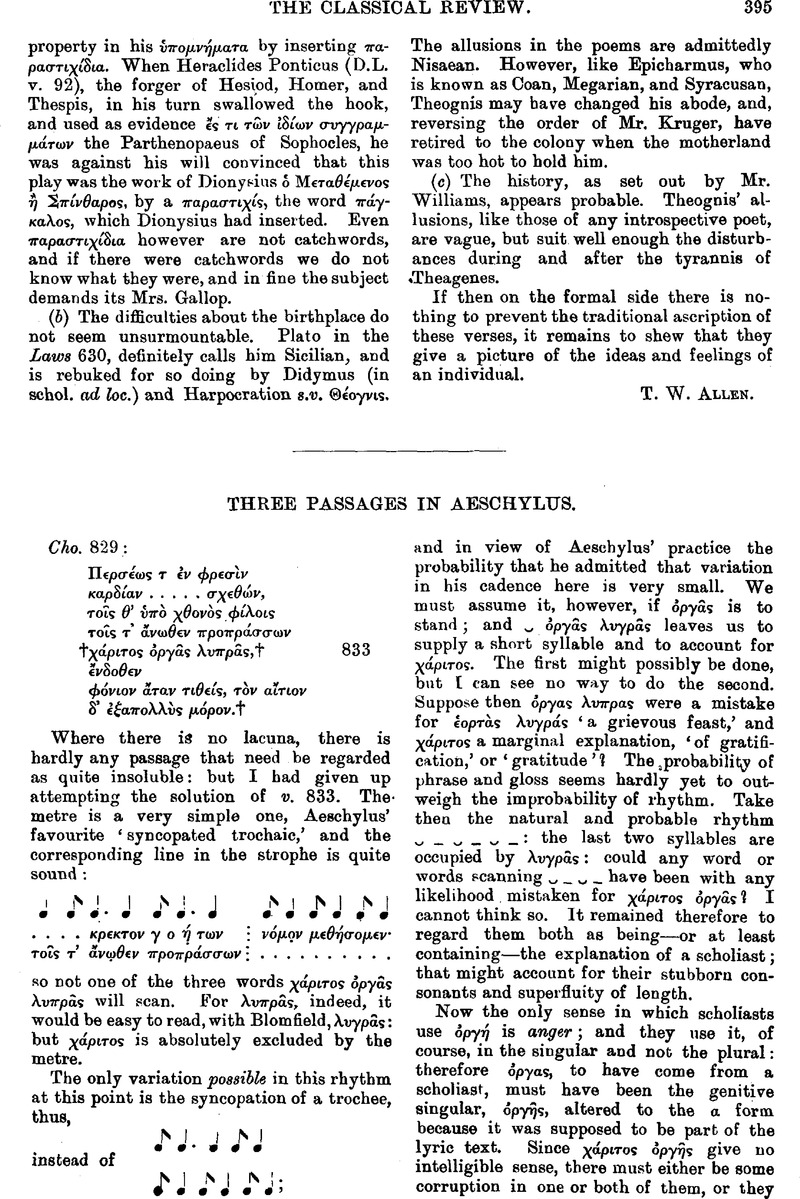No CrossRef data available.
Article contents
Three Passages in Aeschylus
Published online by Cambridge University Press: 27 October 2009
Abstract

- Type
- Review Article
- Information
- Copyright
- Copyright © The Classical Association 1905
References
page 396 note 1 Metrical fragments show that the first ι was long, as in Ἀρτεμῑσ⋯α Ar. Thesm. 1200: Liddell Scott go out of their way to put a short mark over it, and also over ⋯ρτεμισ⋯α.
page 397 note 1 See p. 782 d (iv. p. 217 Schweighaeuser, iii. p. 20 Kaibel) which quotes Cratinus ![]() and continues
and continues ![]() schol. Ar. Pax. 1244, Ἀγκ⋯λη in Hesych. and Bekk. Anecd. 337.
schol. Ar. Pax. 1244, Ἀγκ⋯λη in Hesych. and Bekk. Anecd. 337.
page 398 note 1 This interpretation was wrong; see Schmidt Hesych. i. p. 23, Meineke Com. ii. p. 180.
page 398 note 2 Anacr. fr. 53 ![]() possibly sound, like Sophocles'
possibly sound, like Sophocles' ![]() .
.
page 398 note 3 The (![]() Critias in Ath. 600 e) struck the head of the Ζ⋯νης: Soph. fr. 494, 3
Critias in Ath. 600 e) struck the head of the Ζ⋯νης: Soph. fr. 494, 3 ![]() . In Aesch. Cho. 288 we find
. In Aesch. Cho. 288 we find ![]() , where the sense is certainly
, where the sense is certainly ![]() , which occurs in Lycophron 436. Since Lycophron's verse is
, which occurs in Lycophron 436. Since Lycophron's verse is ![]() , it really looks possible that the phrases may somehow have exchanged places. But cf. Lycophr. 981.
, it really looks possible that the phrases may somehow have exchanged places. But cf. Lycophr. 981.
page 398 note 4 Hesych. has also ⋯γκ⋯λως: ⋯ποτ⋯μως. These are terms in stylistic criticism; but they mean different things. It is perhaps merely a slip that has put one as an interpretation of the other: I do not venture to suggest ⋯γκ⋯λας: ⋯ποτομ⋯ς from Eur. Or. 1476.
page 398 note 5 Or τομ⋯δων: either would do. In Aeneas Tact. 24 ![]() there is a v.l. ⋯κτομ⋯δα: see Orelli p. 204. Hesych. gives
there is a v.l. ⋯κτομ⋯δα: see Orelli p. 204. Hesych. gives ![]() .
.


